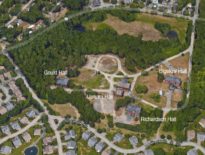Massachusetts’ housing crisis has finally reached the point where nearly everyone is willing to support taking the first step to resolve it.
Gov. Charlie Baker last week unveiled a package of zoning reforms intended to spur the building of over 100,000 new housing units by 2025. If it passes the state legislature, town meetings, city councils and planning boards would no longer have to muster a two-thirds majority to adopt a slew of housing-friendly zoning, including mixed-use and 40R “Smart Growth” districts, legalizing accessory dwelling units, reducing parking and lot size minimums and special permits which grant a project increased density.
The bill is backed by both NAIOP-Massachusetts and the Massachusetts Municipal Association, a sign of how the far awareness of this crisis has spread.
It is also the sort of change that should have been made decades ago.
The two-thirds majority standard has locked many communities into a vicious cycle where good planning is impossible to pass, every land use decision becomes a political fight to the death and suitable projects die despite substantial community support.
A senior living facility proposed in Lexington last year offers a textbook example.
On overgrown land separated from most of the town by Route 2, and from Belmont residents by the Belmont Country Club, National Development sought to build a senior living facility with almost 200 units split between two buildings screened from the road and its few neighbors by a thick belt of trees and public nature trails protected by a conservation easement.
The project would have had limited impact on schools or traffic – free shuttles for residents and employee shift schedules that didn’t line up with rush hour ensured that – and would have provide desperately needed senior housing. Yet, the proposal lost a 106-56 Town Meeting ballot and only passed thanks to an alert resident’s use of parliamentary procedure to force a re-vote the next day, plus last-minute concessions from National Development.
Baker’s bill may not immediately generate schadenfreude – at the stroke of the governor’s pen, 30-story affordable housing towers won’t become as-of-right projects in Chilmark and Dover – but every single Bay Stater who understands that the state’s economic vitality depends on substantially boosting housing production should support for this measure.
They should not stop there, however.
For a variety of reasons – cowardice, myopia, ignorance and plain old inertia – Beacon Hill’s contemptible inaction on Massachusetts’ housing crisis has been allowed to continue for far too long.
Dozens of good ideas wait in the wings, from “Millennial Villages” of student-friendly microhousing, to mandatory TOD zoning, to Minneapolis-style blanket upzoning. However, many will need legislative action to become a reality, especially in the face of suburban intransigence.
Advocates, the business community and residents must use the momentum of this moment to carry the fight forward later in this session and in years to come as the state tries to dig itself out of the hole into which it has slid.




 |
| 

